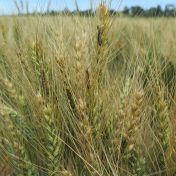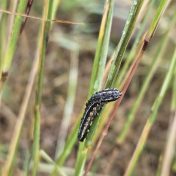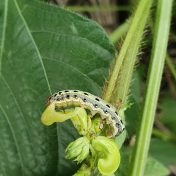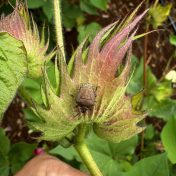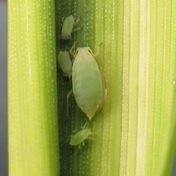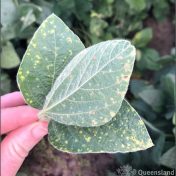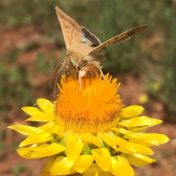As winter cereals, canola and pulses flower and fill grain, and temperatures rise, the risk of infestation by caterpillar pests increases. Below is a quick refresher on the risk of infestation and crop loss by common caterpillar pests: helicoverpa, native armyworms and fall armyworm. Key points: There is increased risk of infestation by Helicoverpa armigera this spring because of the… Read more »
QDAF entomologists have recently inspected several infestations of fall armyworm (FAW) in forage oats on the Darling Downs. Oats are not a preferred host of FAW, but these infestations come at the end of the largest FAW season since the pest arrived in Australia. Oats are not usually inspected for pest insects, but agronomists are advised to check plants for… Read more »
As growers and agronomists are doing battle with fall armyworm (FAW; Spodoptera frugiperda) in maize and sorghum, another species of Spodoptera, the cluster caterpillar (Spodoptera litura; Figure 1) is causing substantial defoliation in summer pulses. We have received reports across Queensland of damaging infestations of cluster caterpillars from soybeans, mungbeans, and peanuts. A cluster caterpillar outbreak of this intensity has… Read more »
High numbers of brown shield bugs (BSB, Dictyotus caenosus) have been reported in cotton fields from Hay through to Texas on the Queensland/New South Wales border. In pulse crops, these bugs (also referred to as ‘stink’ bugs) are part of the podsucking pest complex, and can cause both yield reductions and impacts to seed quality. Adults are about 8mm long… Read more »
The DAF plant pathology team has recently identified powdery mildew and downy mildew from soybean crops growing in the Mackay region. Powdery mildew in soybean is caused by the fungus Erysiphe diffusa. This air-borne pathogen thrives in cool, humid weather. Infected plants develop symptoms initially on older leaves in the lower canopy. Whitish grey powdery patches develop on the upper… Read more »
Detections of Russian wheat aphid Diuraphis noxia (RWA) in New South Wales appeared later than usual this year. RWA was detected in Tambar Springs in northern New South Wales (NSW) in August 2023, followed by detections in the Liverpool Plains, Trangie and Moree Plains. More than 60 cereal and grass samples were collected in northern NSW between April and July… Read more »
Powdery mildew has been detected in several mungbean crops growing in southern Queensland within the last couple of weeks. Powdery mildew in mungbean is caused by the fungal species, Podosphaera xanthii and Erysiphe vignae. Two fungicide options are currently under permit to manage the disease, including tebuconazole products (PER13979 – download the permit from the APVMA portal for more details… Read more »
There have been several recent reports of fungal diseases in winter and spring crops in the northern grains region. Cereal rusts Rust has been detected in cereal crops growing in central and southern Queensland this winter/spring. Monitor crops closely, keeping an eye out for pustules on stems and leaves, and submit rust samples for pathotype testing to the University of… Read more »
Spring has sprung, and as is typical following a wetter winter, insects are abundant in crops. There are native armyworms in winter cereals from Central Queensland to northern NSW. Aphids are abundant in winter cereals, canola and faba beans. Key drivers of pest abundance in wetter seasons are the increased availability of plant hosts over winter and into spring and… Read more »
The DAF pathology team has recently received reports of ergot in sorghum panicles growing near Toowoomba in southern Queensland. Sorghum ergot is caused by the fungus Claviceps africana. The disease can result in poor seed set, lower grain quality, and can cause harvesting issues due to the sticky honeydew on sorghum panicles. Infected grain will be replaced by fungal sclerotes… Read more »
